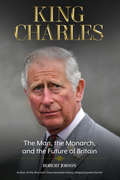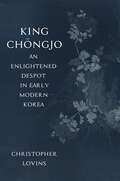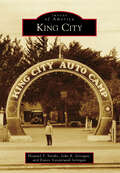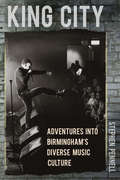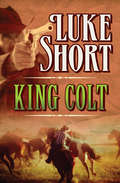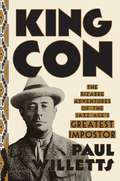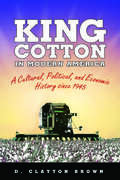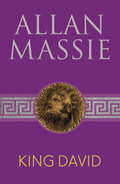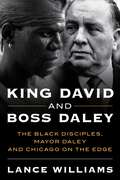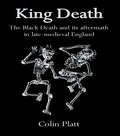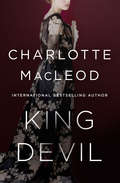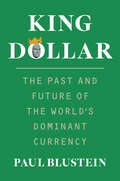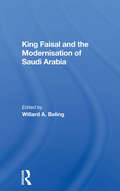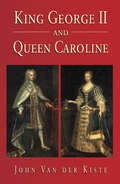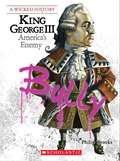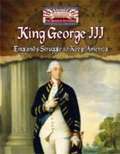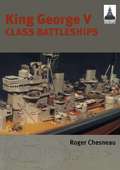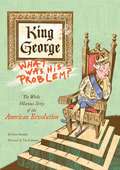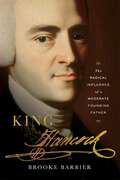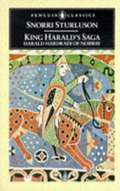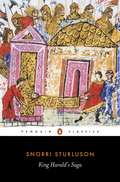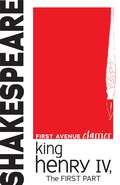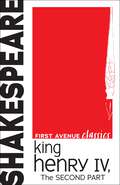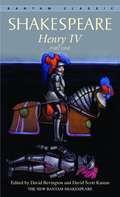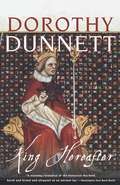- Table View
- List View
King Charles: The Man, the Monarch, and the Future of Britain
by Robert JobsonAn exhaustive and revealing biography of Britain&’s new monarch, King Charles III, with fresh reporting by the journalist the Wall Street Journal dubbed &“the Godfather of royal reporting.&” With exclusive interviews and extensive research, King Charles delivers definitive insight into the extraordinary life of His Royal Highness, former Prince of Wales, as he takes the throne, a watershed moment in modern history and in the British monarchy.New York Times bestselling author Robert Jobson debunks the myths about the man who became king, going beyond banal, bogus media caricatures of Charles to tell his true story. Jobson—who has spent nearly thirty years chronicling the House of Windsor, and has met Charles on countless occasions—received unprecedented cooperation from Clarence House, what was the Prince&’s office, in writing this illuminating biography.King Charles divulges the full range of Charles&’s profoundly held political beliefs: the United Kingdom&’s special relationship to the United States, climate change, Brexit, and immigration—to ultimately portray the kind of monarch Charles III will be. Jobson taps a number of sources close to the now-King who have never spoken on the record before, plus members of the Royal Household who have served Charles during his decades of public life. This comprehensive profile also reveals the late Queen Elizabeth&’s plans to transition Charles to the throne; how at her insistence he already reads all government briefings; and why he feels it is his constitutional duty to relay his thoughts to ministers in his controversial &“black spider memos.&” Moreover, King Charles reveals the truth about Charles's deeply loving but occasionally volatile relationship with his second wife and chief supporter, Camilla. The result is an intriguing new portrait of a man who at last has become king.
King Chǒngjo, an Enlightened Despot in Early Modern Korea: An Enlightened Despot In Early Modern Korea
by Christopher LovinsWere the countries of Europe the only ones that were "early modern"? Was Asia's early modernity cut short by colonialism? Scholars examining early modern Eurasia have not yet fully explored the relationships between absolute rule and political modernization in the highly contested early modern world. Using a comparative perspective that places Chŏngjo, king of Korea from 1776 to 1800, in context with other Korean kings and with contemporary Chinese and European rulers, Christopher Lovins examines the shifting balance of power in Korea in favor of the crown at the expense of the aristocracy during the early modern period. This book is the first to analyze in English the recently discovered collection of 297 private letters written by Chŏngjo himself. These letters were a vital channel of communication outside of official court historians' scrutiny, since private meetings between the king and his ministers were forbidden by custom. Royal politics played out in an arena of subtle communication, with court officials trying to read the king's unstated, elliptically hinted at intentions and the king trying to suggest what he wanted done while maintaining plausible deniability. Through close analysis of both official records and private letters, including Chŏngjo's "secret letters," Lovins shows that, in contrast to previous assumptions, the late eighteenth-century Korean monarchs were not weak and ineffective but instead were in the process of building an absolutist polity.
King City (Images of America)
by Howard P. Strohn John R. Jernigan Karen Vanderwall JerniganThe town of King City came into existence in 1886, when the railroad arrived north of San Lorenzo Creek in the Salinas Valley of Central California. Named after Charles H. King, owner of this portion of the San Lorenzo Land Grant, King City has grown into a hub for the magnificent agricultural fields that surround it and support its economy. US Highway 101 and the Salinas River are unique features of the town, and Mesa Del Rey Airport was instrumental in the training of pilots during World War II. Author John Steinbeck's novel East of Eden is set near King City.
King City: Adventures into Birmingham's Diverse Music Culture
by Stephen PennellBirmingham has a tradition of individualism and experimentation, giving rise to a fragmented but innovative culture. This applies to the city’s contemporary music scene just as it does to the rest of its cultural heritage, which explains why the Birmingham sound is hard to define. Whereas other cities are known for a certain sound, this city celebrates its diversity.In this new decade, the plethora of exciting indie bands, sick rappers and emotive singer-songwriters are surrounded by a collective of DJs, producers, promoters, venues, bloggers and vloggers who promote them. There’s an agglomeration building, coalescing around the Birmingham Music Awards, whose mission is to amplify this uprising to the world.In this book, Stephen Pennell’s reviews and musings shine a light on Birmingham’s finest up-and-coming performers playing the city’s most iconic venues, taking us on a unique journey around Birmingham’s music scene.
King Colt
by Luke ShortA master storyteller of the American frontier presents a western about a town that could not be tamed—and the vicious things men will do for gold. Picket-Stake Hendry has spent thirty years roaming the Calico Mountains in search of gold. Finally, in a lonely little canyon far from civilization, he strikes the mother lode, and as soon as he gets home to register the claim, he&’ll be a millionaire. But before he can make it to Cosmos, a bandit attacks him. Cosmos sheriff Johnny Hendry prefers playing cards to fighting crime, and he&’s kept the peace in this rough-and-tumble western town by letting bandits do whatever they want. But when he hears that Pick, his adoptive father, has been murdered, he vows bloody vengeance. For the sake of the old prospector, he will clean up Cosmos—or die where he stands. This incredible story of frontier justice from author Luke Short, winner of a special Western Heritage Trustees Award and the Western Writers of America&’s Levi Strauss Golden Saddleman Award, is a classic of the genre.
King Con: The Bizarre Adventures of the Jazz Age's Greatest Impostor
by Paul WillettsThe spellbinding tale of hustler Edgar Laplante—the king of Jazz Age con artists—who becomes the victim of his own dangerous game. Edgar Laplante was a smalltime grifter, an erstwhile vaudeville performer, and an unabashed charmer. But after years of playing thankless gigs and traveling with medicine shows, he decided to undertake the most demanding and bravura performance of his life. In the fall of 1917, Laplante reinvented himself as Chief White Elk: war hero, sports star, civil rights campaigner, Cherokee nation leader—and total fraud. Under the pretenses of raising money for struggling Native American reservations, Laplante dressed in buckskins and a feathered headdress and traveled throughout the American West, narrowly escaping exposure and arrest each time he left town. When the heat became too much, he embarked upon a lucrative continent-hopping tour that attracted even more enormous crowds, his cons growing in proportion to the adulation of his audience. As he moved through Europe, he spied his biggest mark on the Riviera: a prodigiously rich Hungarian countess, who was instantly smitten with the con man. The countess bankrolled a lavish trip through Italy that made Laplante a darling of the Mussolini regime and a worldwide celebrity, soaring to unimaginable heights on the wings of his lies. But then, at the pinnacle of his improbable success, Laplante’s overreaching threatened to destroy him… In King Con, Paul Willetts brings this previously untold story to life in all its surprising absurdity, showing us how our tremendous capacity for belief and our longstanding obsession with celebrity can make fools of us all—and proving that sometimes truth is stranger than fiction.
King Cotton in Modern America: A Cultural, Political, and Economic History since 1945
by D. Clayton BrownKing Cotton in Modern America places the once kingly crop in historical perspective, showing how "cotton culture" was actually part of the larger culture of the United States despite many regarding its cultivation and sources as hopelessly backward. Leaders in the industry, acting through the National Cotton Council, organized the various and often conflicting segments to make the commodity a viable part of the greater American economy. The industry faced new challenges, particularly the rise of foreign competition in production and the increase of man-made fibers in the consumer market.Modernization and efficiency became key elements for cotton planters. The expansion of cotton- growing areas into the Far West after 1945 enabled American growers to compete in the world market. Internal dissension developed between the traditional cotton growing regions in the South and the new areas in the West, particularly over the USDA cotton allotment program. Mechanization had profound social and economic impacts. Through music and literature, and with special emphasis placed on the meaning of cotton to African Americans in the lore of Memphis's Beale Street, blues music, and African American migration off the land, author D. Clayton Brown carries cotton's story to the present.
King David
by Allan Massie'David comes alive in this novel as a fascinating, divided self, but you also feel on finishing it that you have understood a little more about the extraordinary world of the Middle East from which so much of our own Judaeo-Christian religion and civilisation spring. Modern parallels are never forced - Massie to too subtle a writer for that - but this world of sex, intrigue, war and religious mania suggests constantly to the reader not memories of the Bible but events in the newspapers in that very Hebron where David ruled as king' AN Wilson, Evening Standard
King David and Boss Daley: The Black Disciples, Mayor Daley, and Chicago on the Edge
by Lance WilliamsIn Chicago in mid-twentieth century amid the haze and smoke of urban renewal and the sounds of the wrecking balls and bulldozers, there lived two men, both street-savvy, one Black, one Irish, one young, one old and both leaders of their clans. Each ruled with an iron fist. Each embodied the fighting spirit of the turbulent 1960s. One was David Barksdale, the Black Disciples leader, a Black youth club that would give birth to America's largest street gang; the other was Richard J. Daley, the legendary Mayor of the City of Chicago. He was one of the longest-serving, most prominent mayors in American history and the last of the big-city "bosses." Although the two never met, at least not face-to-face, their fates were linked by a time of change, an era of protest, which was a decisive moment of transformational power that was on the verge of a violent uprising in America's second-largest city. This is a book that is as lively as its subject. A braided narrative of two larger than life people, it has the boldness to combine two oddly related 1960s stories into a single narrative that is both intimate and epic. One captures the unlikely story of a Negro boy whose share-cropping family migrated from rural Mississippi to Chicago, where he started a street gang that became the largest in America. The book's other path follows America's last big city "boss," whose persona is legendary and bigger than life. While historians, political pundits, and those who knew him speak of "Hizzonor" as being a proud, Irish-Catholic who was the long-time godfather of the Chicago Democratic Party and Mayor who saved Chicago from becoming another Detroit or Cleveland, they also acknowledge that he was a fierce segregationist. He had a contentious relationship with civil rights leaders like Dr. Martin Luther King, Jr. Richard Daley also played a significant role in the history of the United States Democratic Party.Williams an internationally recognized gang expert and interventionist, eloquently tells the story of these men, their clans, and their on-going struggle for power, status, and legacy. However unheard of and unimaginable, some of the incidents may seem, this is not a work of fiction. Everything written comes from archival documents, official reports, focus groups, in-depth interviews, or first-hand accounts. The action takes place mostly in Chicago's Englewood neighborhood. Still, there are some occasions where the action takes place in Bronzeville, the Woodlawn community, on the West Side of the City and downtown.
King Death: The Black Death And Its Aftermath In Late-Medieval England
by Colin PlattThis illustrated survey examines what it was actually like to live with plague and the threat of plague in late-medieval and early modern England.; Colin Platt's books include "The English Medieval Town", "Medieval England: A Social History and Archaeology from the Conquest to 1600" and "The Architecture of Medieval Britain: A Social History" which won the Wolfson Prize for 1990. This book is intended for undergraduate/6th form courses on medieval England, option courses on demography, medicine, family and social focus. The "black death" and population decline is central to A-level syllabuses on this period.
King Devil
by Charlotte MacLeodA historical mystery set in early twentieth-century New England from the acclaimed author of the Peter Shandy series. Upon graduating from an academy for respectable young ladies, Lavinia Tabard heads to the New England countryside and her rich cousin Zilpha&’s summer cottage with the low expectations of a charity case. Lavinia intends to endure Zilpha&’s saccharine sweetness and her &“companion&” Tetsy&’s bullying ways only until she can plan an escape that doesn&’t involve marriage. A welcome distraction comes when, as she works on a grave rubbing at the local cemetery, Lavinia notices something strange about the dates on the stone. Her questions lead to the doorsteps of several interesting neighbors, including a self-made young architect with a temper as fiery as his red hair. Hayward Clinton and his partner have an office on Zilpha&’s property, an awkward situation that won&’t change until the mysterious disappearance of the business&’s original owner is solved. It&’s a case too curious for Lavinia to resist—but someone will stop at nothing to ensure that she does. King Devil is an entertaining tale of suspense from the acclaimed author of the Peter Shandy Mysteries, as well as the Boston-set Sarah Kelling and Max Bittersohn series.
King Dollar: The Past and Future of the World's Dominant Currency
by Paul BlusteinAn award-winning economic journalist on why the US dollar is positioned to maintain global primacy—and what that means for America and the world Prophecies that the dollar will lose its status as the world&’s dominant currency have echoed for decades—and are increasing in volume. Cryptocurrency enthusiasts claim that Bitcoin or other blockchain-based monetary units will replace the dollar. Foreign policy hawks warn that China&’s renminbi poses a lethal threat to the greenback. And sound money zealots predict that mounting US debt and inflation will surely erode the dollar&’s value to the point of irrelevancy. Contra the doomsayers, Paul Blustein shows that the dollar&’s standing atop the world&’s currency pyramid is impregnable, barring catastrophic policy missteps by the US government. Recounting how the United States has wielded the dollar to impose devastating sanctions against adversaries, Blustein explains that although targets such as Russia have found ways to limit the damage, Washington&’s financial weaponry will retain potency long into the future. His message, however, is that America must not be complacent about the dollar; the great power that its supremacy confers comes with commensurate responsibility.
King Faisal And The Modernisation Of Saudi Arabia
by Willard A. BelingThe late King Faisal bin Abdul Aziz was born in Riyadh in 1905/6, several years after his father Abdulaziz Ibn Saud had recaptured it from Ibn Rashid. In 1964 he became king of Saudi Arabia, famous for harbouring twenty five percent of the world's oil reserves and hailed as the most powerful Arab ruler in centuries. In 1975, his nephew shot him in
King George II and Queen Caroline
by John Van der KisteThis biography of the last king to lead British troups into baffle and his able wife provides intriquing insight into 18th century war and politics. Often derided as the buffoon who "hated all boets and bainters", George II was fortunate to be served by Prime Ministers Sir Robert Walpole and William Pitt, and was wise enough to leave the business of government to them. His wife, generally regarded as the ablest of British queens between Elizabeth I and Queen Victoria, used her influence in politics and patronage so that she and Walpole effectively ruled the kingdom between them. Her death in 1737 was seen as a national calamity. Illustrated throughout, this new biography provides a much-needed reevaluation of these monarchs and the times in which they ruled.
King George III: America's Enemy
by Philip BrooksA children's biography of King George III, who was King of England during the American revolution.
King George III: England's Struggle to Keep America
by Steve RobertsKing George III who ruled Great Britain, is remembered as the "king who lost America". This book covers his life and reign of the British Empire.
King George V Class Battleships (ShipCraft #2)
by Roger ChesneauThe ShipCraft series provides in-depth information about building and modifying model kits of famous warship types. Lavishly illustrated, each book takes the modeller through a brief history of the subject class, highlighting differences between sister-ships and changes in their appearance over their careers. This includes paint schemes and camouflage, featuring colour profiles and highly-detailed line drawings and scale plans. The modelling section reviews the strengths and weaknesses of available kits, lists commercial accessory sets for super-detailing of the ships, and provides hints on modifying and improving the basic kit. This is followed by an extensive photographic gallery of selected high-quality models in a variety of scales, and the book concludes with a section on research references books, monographs, large-scale plans and relevant websites.The five battleships of the class covered by this volume were the most modern British capital ships to serve in the Second World War. They were involved in many famous actions including the sinking of both Bismarck and Scharnhorst, while Prince of Wales suffered the unfortunate distinction of being the first capital ship sunk at sea by air attack.
King George: What Was His Problem? - Everything Your Schoolbooks Didn't Tell You About The American Revolution
by Steve SheinkinKING GEORGE NEVER DID UNDERSTAND AMERICANS. "Entire books have been written about the causes of the American Revolution. This isn't one of them. "What it is, instead, is utterly interesting, anecdotes (John Hancock fixates on salmon), from the inside out (at the Battle of Eutaw Springs, hundreds of soldiers plunged into battle "naked as they were born") close-up narrative filled with little-known details, lots of quotes that capture the spirit and voices of the principals ("If need be, I will raise one thousand men, subsist them at my own expense, and march myself at their head for the relief of Boston" - George Washington), and action, It's the story of the birth of our nation, complete with soldiers, spies, salmon sandwiches, and real facts you can't help but want to tell to everyone you know. King George: What Was His Problem? is a 2009 Bank Street - Best Children's Book of the Year.
King Hancock: The Radical Influence of a Moderate Founding Father
by Brooke BarbierA rollicking portrait of the paradoxical patriot, whose measured pragmatism helped make American independence a reality.Americans are surprisingly more familiar with his famous signature than with the man himself. In this spirited account of John Hancock’s life, Brooke Barbier depicts a patriot of fascinating contradictions—a child of enormous privilege who would nevertheless become a voice of the common folk; a pillar of society uncomfortable with radicalism who yet was crucial to independence. About two-fifths of the American population held neutral or ambivalent views about the Revolution, and Hancock spoke for them and to them, bringing them along.Orphaned young, Hancock was raised by his merchant uncle, whose business and vast wealth he inherited—including household slaves, whom Hancock later freed. By his early thirties, he was one of New England’s most prominent politicians, earning a place on Britain’s most-wanted list and the derisive nickname King Hancock. While he eventually joined the revolution against England, his ever moderate—and moderating—disposition would prove an asset after 1776. Barbier shows Hancock appealing to southerners and northerners, Federalists and Anti-Federalists. He was a famously steadying force as president of the fractious Second Continental Congress. He parlayed with French military officials, strengthening a key alliance with his hospitable diplomacy. As governor of Massachusetts, Hancock convinced its delegates to vote for the federal Constitution and calmed the fallout from the shocking Shays’s Rebellion.An insightful study of leadership in the revolutionary era, King Hancock traces a moment when passion was on the side of compromise and accommodation proved the basis of profound social and political change.
King Harald's Saga
by Magnus Magnusson Hermann PalssonThe story of King Harald (The Ruthless) of Norway, a contemporary of King Harold of England and William The Conqueror of Normandy. Harald attempted to claim for Norway the English throne and succeeded in marching to Chelsea before his army was defeated by English King Harold's troops and Harald was killed. Harold himself was defeated only nineteen days later by William of Normandy. Harald's demise though marked the end of the Viking era, of centuries of Scandinavian harrassment of England. Magnusson and Palsson wrote the introduction and translated the saga into English.
King Harald's Saga
by Snorri SturlusonThis compelling Icelandic history describes the life of King Harald Hardradi, from his battles across Europe and Russia to his final assault on England in 1066, less than three weeks before the invasion of William the Conqueror. It was a battle that led to his death and marked the end of an era in which Europe had been dominated by the threat of Scandinavian forces. Despite England's triumph, it also played a crucial part in fatally weakening the English army immediately prior to the Norman Conquest, changing the course of history. Taken from the Heimskringla - Snorri Sturluson's complete account of Norway from prehistoric times to 1177 - this is a brilliantly human depiction of the turbulent life and savage death of the last great Norse warrior-king.
King Henry IV, The First Part (First Avenue Classics ™)
by William ShakespeareThe year is 1402, and King Henry IV sits uneasily on the throne that he wrested from his predecessor, Richard II. King Henry disapproves of his son, Prince Henry, and his habit of hanging around criminals like the witty but dishonest Falstaff. Meanwhile, young "Hotspur" Percy helps his family plot a rebellion to overthrow the king. Civil war is imminent, and the fate of the kingdom will be decided in a great battle at Shrewsbury. Faced with bloodshed, Prince Henry must find it within himself to be the son and heir his father has always wanted him to be. First published in 1598, this unabridged version of William Shakespeare's history play is the second in his tetralogy about the rise of the English royal House of Lancaster.
King Henry IV, The Second Part (First Avenue Classics ™)
by William ShakespeareIn this second part of Henry IV, the Battle of Shrewsbury is over, the rebels temporarily beaten but not defeated. Prince Henry defeated "Hotspur" Percy in single combat, but other rebel leaders have taken his place. King Henry, drained by the civil war, is deathly ill. Prince Henry, knowing he must soon assume the throne, tries to distance himself from the rowdy and reprobate friends of his youth, including Falstaff. As rebel forces gather at the Forest of Gaultree and King Henry grows sicker, will Prince Henry be able to prove to his father that he has become worthy of wearing the crown? First published in 1600, this unabridged version of William Shakespeare's history play is the third in his tetralogy about the rise of the English royal House of Lancaster.
King Henry V
by William Shakespeare David Bevington David Scott Kastan James Hammersmith Robert Kean Turner Joseph PappA play alive with escapades and action, comedy and history, "Henry IV, Part One begins the transformation of the madcap Prince Hal into the splendid ruler King Henry. In it a rebellion against King and State is juxtaposed with another rebellion-the riotous misbehavior of Hal and his companions, principally Falstaff. A superbly funny liar, coward, lecher, and cheat, the larger-than-life character Falstaff turns this great historical drama into a masterpiece of counterpoint and design. Each Edition Includes: - Comprehensive explanatory notes - Vivid introductions and the most up-to-date scholarship - Clear, modernized spelling and punctuation, enabling contemporary readers to understand the Elizabethan English - Completely updated, detailed bibliographies and performance histories - An interpretive essay on film adaptations of the play, along with an extensive filmography Copyright © Libri GmbH. All rights reserved.
King Hereafter
by Dorothy DunnettBack in print by popular demand--"A stunning revelation of the historical Macbeth, harsh and brutal and eloquent." --Washington Post Book World.With the same meticulous scholarship and narrative legerdemain she brought to her hugely popular Lymond Chronicles, our foremost historical novelist travels further into the past. In King Hereafter, Dorothy Dunnett's stage is the wild, half-pagan country of eleventh-century Scotland. Her hero is an ungainly young earl with a lowering brow and a taste for intrigue. He calls himself Thorfinn but his Christian name is Macbeth.Dunnett depicts Macbeth's transformation from an angry boy who refuses to accept his meager share of the Orkney Islands to a suavely accomplished warrior who seizes an empire with the help of a wife as shrewd and valiant as himself. She creates characters who are at once wholly creatures of another time yet always recognizable--and she does so with such realism and immediacy that she once more elevates historical fiction into high art.rade Paperback edition.
